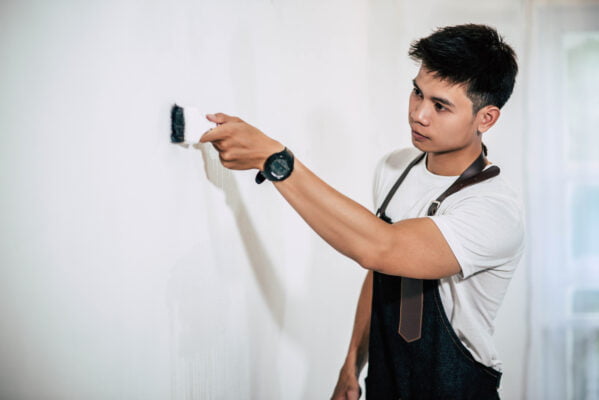


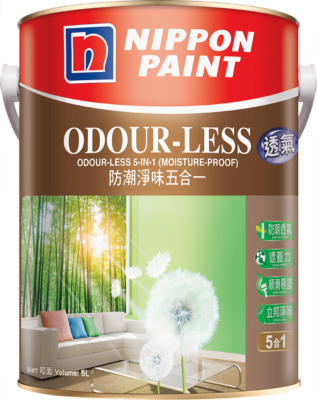

If you know something about the painting process, you may have heard the term “shoveling” and know that it is more expensive to paint walls with shovel. In fact, there are more factors that affect the price of painting. For the same “shovel bottom”, the price can also vary greatly. Does your wall need to be shoveled? What factors affect the price of oil paint walls? Before answering these questions, let’s take a look at a complete wall painting process:
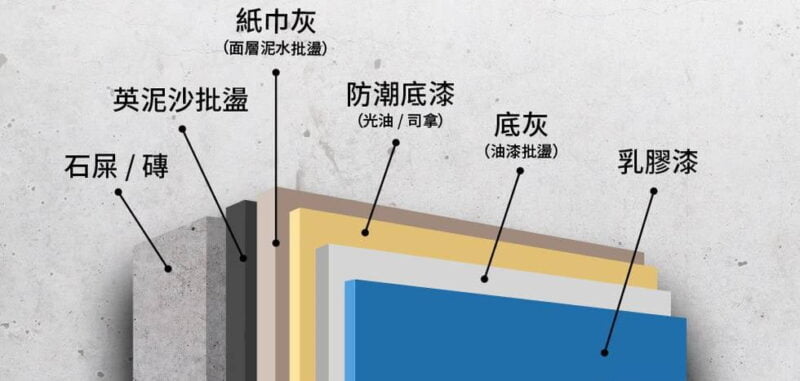
The so-called “shoveling” refers to removing the old latex paint and primer from the wall. The master will first wet the wall with white water or clean water, and then use a paint shovel to remove the old oil. After shoveling the bottom, the painter needs to re-apply moisture-proof oil and dust before applying new latex paint.
“Shoveling” is more reliable for the durability of new paint, but it is also more expensive. Most households in Hong Kong will choose this approach when decorating. However, in the following situations, you can also consider the cheaper method of not shoveling the bottom:
If you are renovating a new building and the developer’s original plastering work is good, then the master only needs to lightly smooth the wall with sandpaper and then apply latex paint directly. You can first check with the developer about the original latex paint brand to avoid incompatibility between the old and new paint.
If you want to renovate an old building, but the plaster on the wall is strong enough and only slightly damaged, and the budget is limited, you can ask a master to “paint it”, that is, apply a layer of plaster to the area to repair it, and then paint it.
If the wall paint in your unit is not very old (within three years), and the overall condition of the wall is considered good, and there are no holes or blisters when you touch it with your fingers, you can consider painting it directly on the old wall. Fresh paint. It is best to choose a paint color that is the same as or close to the original wall. Otherwise, the effect of the oil may be biased or unsatisfactory.
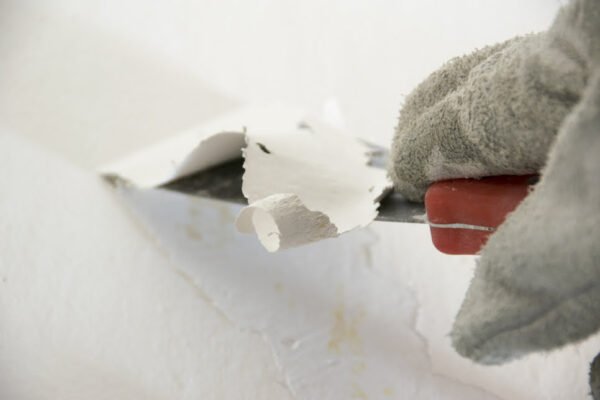
How deep should the shovel be?
Just looking at the wording, laymen may easily think that when the master shovels the bottom, he will “shovel it to the bottom” or “shovel it until you see stone feces”. In fact, this is a misunderstanding. To put it simply, when the master shovels the bottom, he should shovel it until it is solid. The most common situation is that the base layer of the wall is intact, and the master will shovel away the old paint and primer. Sometimes the bottom ash is so strong that the master cannot even shovel away all the bottom ash.
However, if there are problems with the deeper layers, such as aging and splitting of paper towels, dust, or separation from the concrete (living away from the shell), the master will need to shovel deeper. If the scope of the problem is too deep and large, theoretically it will be necessary to redo the mud and water plastering, which goes beyond the ordinary painting process and will incur additional costs.
This is often a trigger point for conflicts: careful and experienced craftsmen may be able to detect criticism issues early when quoting, but more often than not they are discovered after construction begins. If you are a master, should you ask for a surcharge?
Therefore, how deep the master will shovel the bottom actually depends on the project cost. The price is high enough, even if the bottom ash is not thrown up, you can still shovel it clean, and even use a chisel; on the other hand, if the customer is stubborn and refuses to pay the surcharge, in order to avoid conflicts, the master will not dare to shovel it even if the dust begins to age. too deep. Now some masters will directly indicate on the quotation where they will shovel, such as “shoveling away the old paint” or “shoveling away the dust”, etc.
By the way, problems such as paper towel dust may appear after the completion of the project. Processes such as applying moisture-proof primer will cause the humidity to change, which may trigger the corrosion of the already aged but still very strong during construction, leaving the shell only after completion. The master may not be able to predict this situation in advance, so he can only pay more attention to the gray state of the paper towels when renovating old buildings.
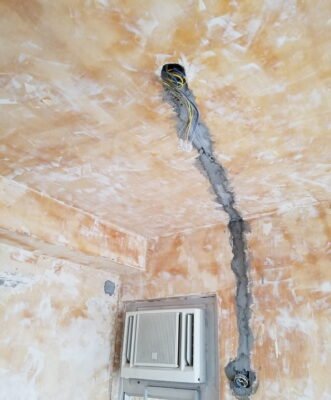
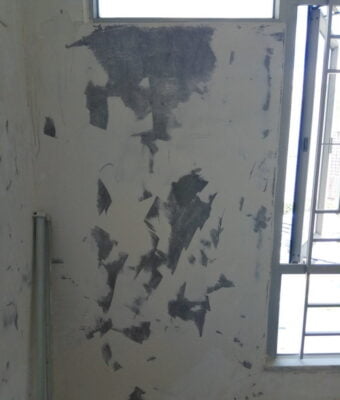
Wall Construction: What’s Under the Paint?
The main material of the wall is concrete or bricks. On the outside, a layer of mud sand is traditionally made, and then a layer of paper towel ash, red gypsum or fiber ash is made. The new expensive method is to use gunite. / Mortar plastering is replaced. The above are all muddy processes, and then there are the painting processes such as moisture-proof oil, dust removal, and latex paint. As the building gets older and undergoes more renovations, the wall may have several layers of dust from different ages.
Causes and solutions of wall cracks
All cracks in the wall are just the result. Only by understanding the cause can we prescribe the right remedy. The following are four common wall cracks. The first three can be classified as hairline cracks and are only related to appearance problems. However, if the last type of structural cracks occurs, be careful because it is a safety hazard.
1. Water collecting cracks
Solution: Repair after water collection is completed
New buildings/newly built brick walls will “receive water” within half a year. During this period, the muddy water on the wall will shrink as the humidity drops, causing water retraction marks to appear on the wall. In addition to new walls, this situation may also occur when rebuilding mud plastering or building new electric light pits.
The water marks will generally stop growing within half a year. The householder can make an appointment with the master during the decoration, and then repair them all at once when they stabilize. The repair method is to first widen the cracks, fill them with caulking agent, and then apply dust and latex paint. The process is relatively simple, and DIY is also possible.
2. Thermal expansion and contraction cracks
Solution: Add anti-cracking net/paper tape, but it is difficult to completely solve the problem
Thermal expansion and contraction lines are caused by the difference in thermal expansion and contraction of different materials. They are often found at the connection locations (commonly known as “collision”) between walls and other structures such as light troughs, wooden latticework, and body panels; or between two images of different materials. Walls, such as concrete walls, brick walls, etc.
It is difficult to completely avoid thermal expansion and contraction, but don’t worry too much. They are usually the most serious in the first year after renovation, and will stabilize after four seasons. When decorating or repairing, adding anti-cracking mesh/paper tape at the connecting location can slightly reduce the chance of thermal expansion and contraction marks. The repair method for thermal expansion and contraction marks is similar to that of water shrinkage marks.
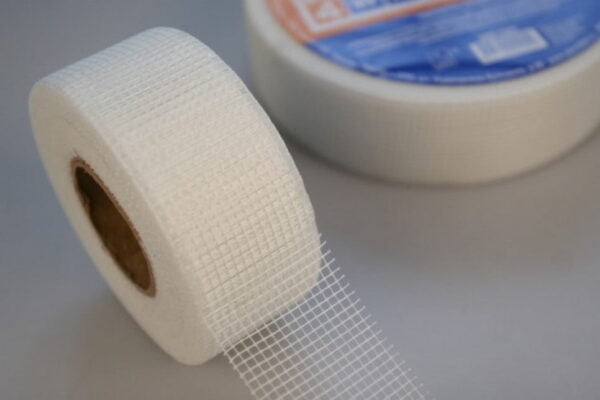
It is difficult to completely avoid thermal expansion and contraction marks, but anti-cracking nets can slightly reduce the chance of occurrence.
3. Criticism issues
Solution: rebuild from the ground up
There are different layers of paint on the wall, and the painting process usually only deals with the outer layer of paint primer. The mud inside, such as paper towel dust, British mud, etc., may pop up and crack off the wall as it ages, causing the paint to crack or even peel off in large areas.
If this problem is discovered in the early stage of decoration, you can ask the master to shovel deeper when shoveling the bottom and recreate the muddy water layer. However, the problem of plaster layer may also be stimulated by the project and appear some time after completion. At this time, only partial repairs can be made and it is difficult to cure it.
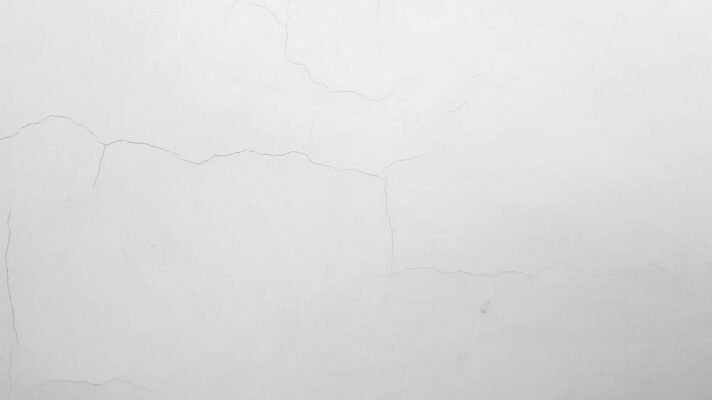 By tapping the wall lightly, you can judge from the sound whether the criticism has “leaved the valley”.
By tapping the wall lightly, you can judge from the sound whether the criticism has “leaved the valley”.
4. Structural cracks
Solution: Find someone to survey
Such cracks penetrate through the plaster layer and penetrate deep into the concrete. They are generally wider and longer, and sometimes contain rust from the steel bars. Cracks in concrete may involve building structures such as settlement, overloading, vibration, poor construction, etc. Water seepage in the wall causes the steel bars to rust, swell, and crack the concrete, which are also common causes.
Different from the first three types of cracks, structural cracks are not only a cosmetic problem, but also a safety issue. Therefore, it is necessary to conduct an investigation to find out the cause before formulating a repair plan.
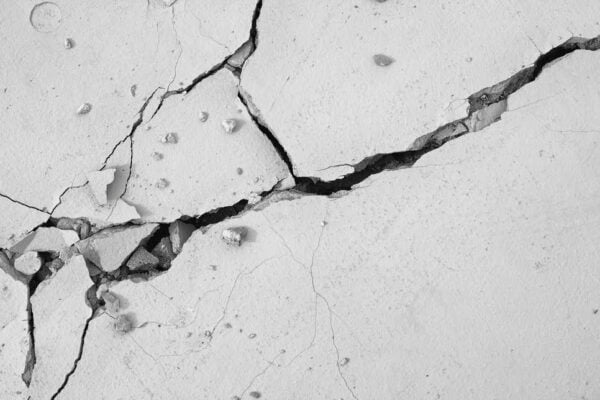
Strictly selected paint, safety first
When purchasing paint, in addition to the color, you should also pay attention to the quality and waterproofness of the paint. Because there are many brands and categories of paint, you can check with a professional painter. One thing worth mentioning is that if there are children or pregnant women in the family, everyone must pay attention to the volatility of paint. It is best to choose paint with less toxic chemicals. Although the paint will be more expensive, safety is paramount, so Everyone is advised to choose paint carefully.
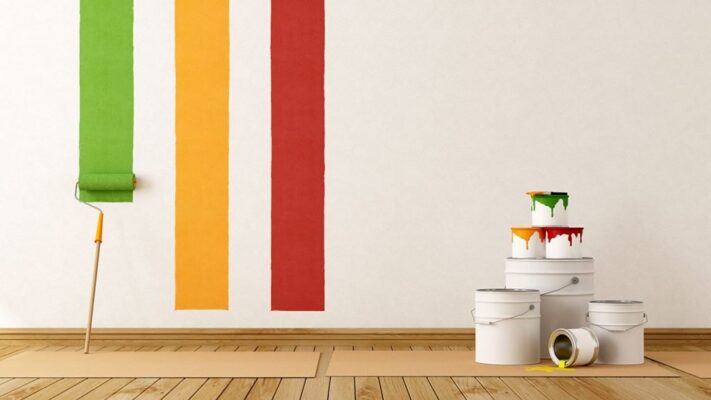
Or you can consider whether post-pressure painting work is required. When the painting project is in progress and after it is completed, everyone needs to pay special attention to the ventilation problem of the unit. It is recommended to open the windows as much as possible during the process and for half a month to a month after the completion to allow enough air circulation to make the paint work better. It can be completely dried, and secondly, all volatile gases can be completely taken away.
Wall maintenance
Not only do most units in Hong Kong lack sunlight, but Hong Kong is often in the humid season, so everyone has to pay some attention to wall maintenance. For example, it is customary to open the windows to create air convection in the unit to take away dead air and moisture. It is also recommended that you turn on a dehumidifier on rainy days or when the weather returns to the south to keep the unit dry. In addition, you should also try to avoid installing too many shelves or placing too many clutter on the wall to avoid moisture accumulation.
What are primers and topcoats?
People usually can’t tell the difference between topcoat and primer. When DIY painting at home, they buy cement paint or latex paint directly from the hardware store, mix it at home and paint directly. This layer is the topcoat, but they often ignore the primer. The importance of paint, what is the difference between primer and topcoat? The following editor will introduce it to you.
The role of primer
Primer, also known as primer, is something that is pre-coated on the material before painting. The primer allows the paint to adhere to the surface of the material, making the paint more durable, and provides additional protection to the painted material so that the topcoat can be evenly absorbed, thereby achieving better results in paint decoration.
It has strong alkaline resistance and can prevent the wall from anti-alkaline corrosion;
Effectively seals the base layer to make the wall stronger;
Enhance the adhesion of topcoat and have strong penetrating ability;
Make up for minor cracks and improve the flatness of the wall. If the wall is relatively flat, you don’t need to use primer. Of course, the effect will be better.
The role of topcoat
Topcoat, also known as finishing paint, is the last layer of paint applied during wall decoration. The overall effect after decoration is reflected through this layer of paint. Therefore, topcoat has high requirements on materials and requires Very good chroma and brightness etc.
Decoration function: Create a sense of space, show unique style, and beautify the interior and exterior through the combination of color, luster, and texture.
Protection function: Different coatings provide different functional protection, such as toughness of the coating film, anti-mildew and antibacterial, anti-fouling, wear resistance, etc.
How to choose paint color
In addition to affecting the atmosphere and sense of space in a home, the paint color of the wall is more likely to affect people’s feelings and emotions. Through the selection and matching of different colors, it gives people different looks and perceptions. Here are some commonly used paint color systems.
1. White paint
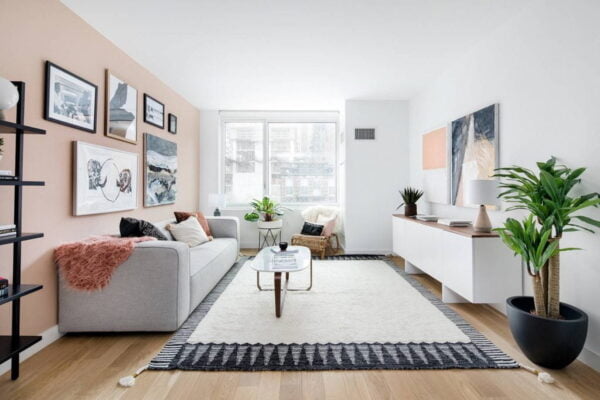
White is the most accepted color and has the highest proportion of use in all parts of the world. At the same time, white is also the brightest color among all colors. White is a symbol of light, giving people a feeling of cleanliness, clarity, and purity. It is visually refreshing and magnifying, and it is easy to match with paints of other colors. White paint can also greatly enhance the sense of space in your home. When you use the same color on both ends of a small space and then use white paint on the middle two, you can make the entire space elongate and extend.
2. Blue paint
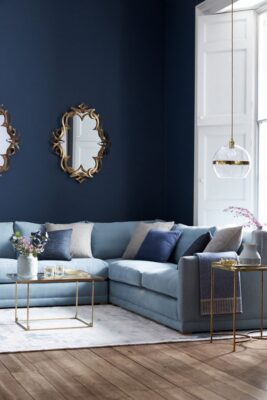
Blue is a very popular color, and it is also one of the natural colors. It mainly includes the colors of the sea and the sky, giving people a quiet, soft and comfortable feeling. Scientific research has pointed out that blue can make people calm and use it at the same time. One calms the mind. Unlike other colors, different depths of blue can be used in different areas of the home to bring a unique visual feel.
3. Green paint
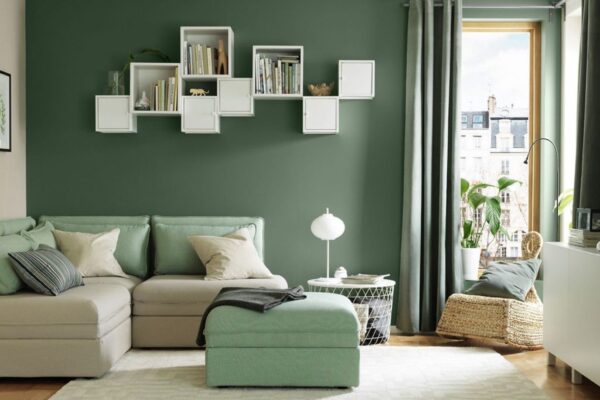
Light green, gray green, grass green, retro green and other colors in green are very popular in home wall colors.
At the same time, because green can directly form an image on the human retina, it is the easiest color for the eyes to see. Green helps people relax while reading and improve concentration and attention, so it is especially suitable for use in learning places.
4. Mango yellow paint
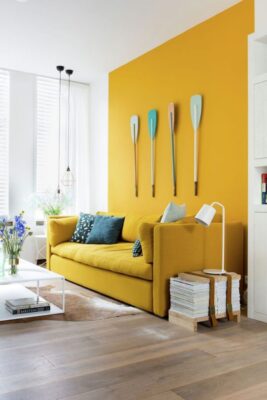
The popular colors in recent years are mostly bright and lively colors. One example is yellow.
Yellow is a more eye-catching color. If your home is painted bright yellow, the visual effect will be too strong. Therefore, “mango yellow”, which is darker than bright yellow, will give people a more comfortable feeling without losing vitality. In addition, the yellow color actually helps increase the body’s appetite, so it is particularly suitable for walls in restaurants, dining rooms, etc.
5. Pink paint
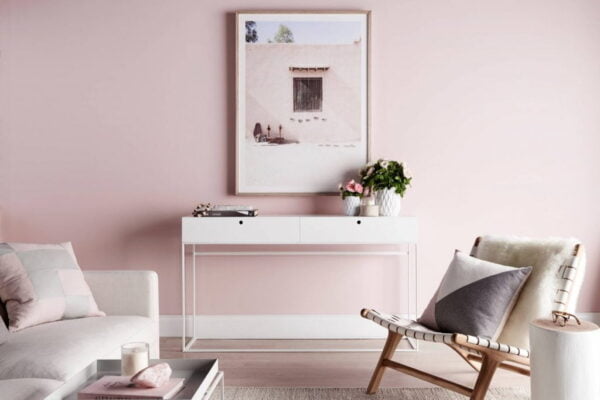
Pink, pink blue and pink green are definitely colors that women cannot resist. When these three colors are used together, women will usually scream: “So beautiful”, because the pink color will make people feel like they are in a fairy tale, like first love. Pink paint is used in homes, and when combined with metal furniture, it can produce a delicate, simple, girly effect. It is generally used in single women’s homes or women’s bedrooms.
6. Dark black paint
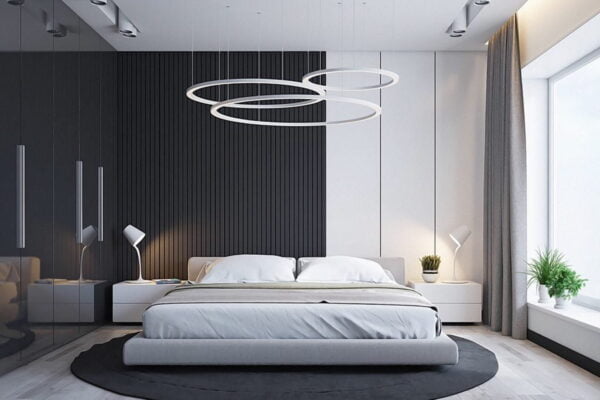
Dark black, such as black, dark gray, dark green, etc., not many people can accept dark paint on walls. Dark colors can create a sense of style and nobility.
However, everyone should pay attention. If the indoor space is not large, it is recommended not to use dark black paint as much as possible, because this will make the entire space smaller and more oppressive, producing unexpected counter-effects.
| 翻新 | 整個單位, 個別房間, 個別牆身 |
|---|---|
| 所需油油服務 | 翻新油油, 執灰油油, 剷底批灰油油 |
$
Flat K & Flat N, 12/F, King Wing Plaza Phase 1, Shek Mun, Shatin, NT, Hong Kong (Map) Mon. to Sat. 10:00-19:00
17/F, NPAC, 10 North Point Road, North Point, Hong Kong (Map) Mon. to Sat. 10:00-19:00
Unit F, 27/F, Plaza 88, 88 Yeung Uk Road, Tsuen Wan, NT, Hong Kong (Map) Mon. to Sat. 10:00-19:00
電郵地址:請選擇類別


